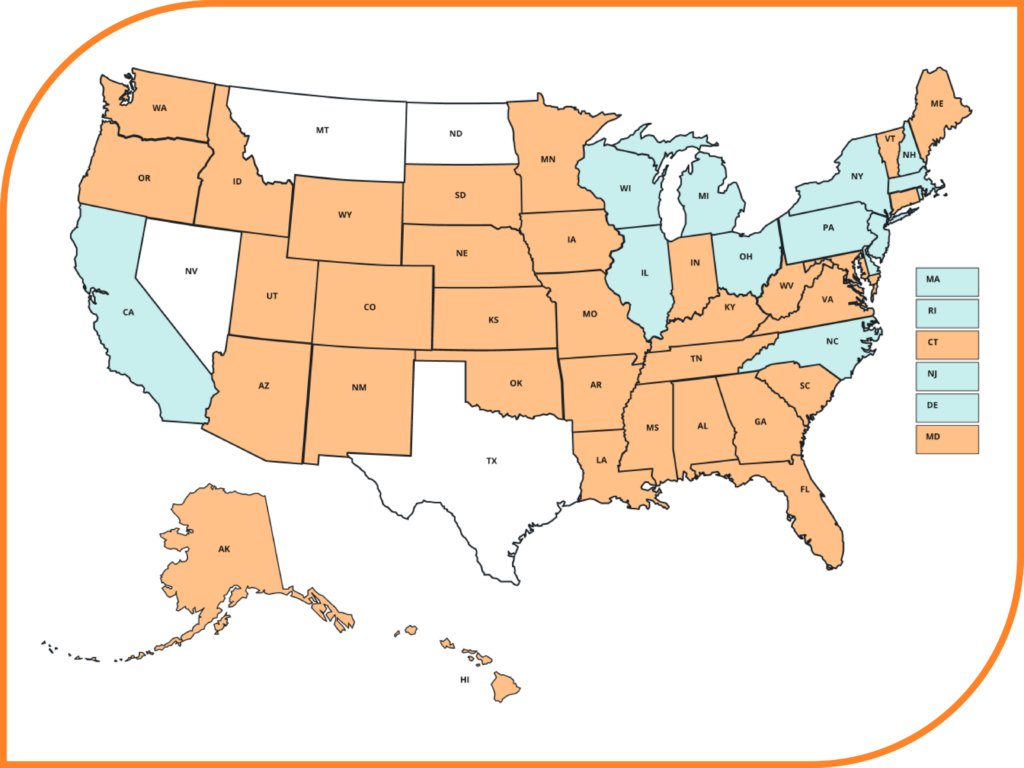It’s hard to believe that we are already more than halfway through 2024. Thirty-three states have already finished up their legislative work, and four states didn’t meet at all in 2024. In fact, just 13 state legislatures are still in their 2024 regular legislative sessions. Most state legislatures won’t meet again until early 2025.

State legislative advocates are beginning to assess the impacts of their respective legislative sessions, and hopefully also getting some rest. At the same time, state legislators are turning their attention towards the campaign trail. We at Plural wanted to take a high-level look at some of the work accomplished so far in 2024.
2024 State Legislative Activity By the Numbers
Let’s break down legislative activity into some stats:
- More than 110,000 bills and resolutions have been considered since January 1, 2024
- There have been more than 500 executive vetoes
- Nearly 10,000 bills have become law
Of course, these numbers only show the scope of state legislative processes. They don’t get at what really matters, which is the detail of the policies considered, vetoed, and passed. Below, we examine policymaking highlights from the first half of 2024. In particular, we examine how policymaking has played out across three legislative areas.
Appropriations Work in 2024
About 25% of states pass biennial (two-year) budgets in odd years, meaning that they did not need to pass a budget in 2025. However, most states needed to pass a budget to fund their services in FY2025, which for most states starts on July 1, 2024.
Several states have not yet finalized their FY 2025 budgets. However, most legislatures were able to complete the work. One trend we saw in budget negotiations this year was concern over inflation and the near-term future of the economy. Large-scale investments in new services were relatively muted compared to the last few years. Many states, including Maine and New Hampshire, took significant steps to store surplus money in their “rainy day funds.”
Almost every state will need to pass a new budget in the 2025 legislative sessions. Some will even need to pass two-year budgets. We can expect that the economy and the election will continue to play a factor in determining how eager legislators are to spend money.
Education Policy in 2024
As always, education funding and policy has occupied a significant amount of focus in state legislatures this year. As mentioned above, fewer budgets needed to be passed in 2024. This meant that large-scale education funding was only up for debate in a few states.
New York saw its education budget increase by nearly $1 billion. Legislators there extended Mayoral Control of the New York City School District for another two years, delaying that policy fight once again.
Debates over charter schools and Education Scholarship Accounts (ESA) are becoming commonplace, both in New York and elsewhere. ESAs generally provide public funding to families to use for their child’s education. They can be spent on tutoring, or enrolling the child in a private school. Like charter schools, ESAs are highly controversial. Advocates argue they provide necessary freedom to families. On the other hand, critics flag the risk they pose to public school funding.
Louisiana’s SB 313 was one of the biggest breakthroughs for “school choice” advocates so far in 2024. The bill, which recently became law, will replace an existing voucher program with a tiered pathway towards universal school choice. Under the law, stipends will be provided to all students, regardless of need.
Battles over funding and school choice are just a small portion of education policy discussions. Other common topics include dealing with chronic absenteeism, workforce development, and dual enrollment programs.
Voting Rights and Election Legislation in 2024
In an election year, legislation impacting voting rights tends to feel more critical and controversial. This has certainly been the case in 2024. However, this enhanced focus hasn’t stopped legislators from debating and passing several laws that will impact voting in November.
The Voting Rights Lab is a great source for tracking up-to-date information about changes in voting policy. So far this year, they have tracked over 1,700 bills across 44 states and Washington, DC. Of those, they identified 308 pieces of legislation that were harmful to voter access or election administration. They also identified 885 bills that, in their opinion, would improve voter access and election administration.
Laws Restricting Voting Access
Under its new governorship, the Louisiana legislature has enacted several laws that could restrict voting access. This includes:
- HB 114, which would require an additional annual canvass of registered voters. This law could result in more registered voters being deemed “inactive.”
- SB 436, which requires that those registering to vote provide proof of United States citizenship.
- SB 218 targets many measures that promote voting accessibility. This includes, among others:
- Limiting who may join a permanent mail voter list
- Limiting common activities to distribute mail-in ballots
- Increasing requirements for voters requiring assistance in voting
It’s worth noting that not all of these bills will be in effect by this November’s elections.
Laws Increasing Access to Voting
Efforts to increase access to voting were both more prevalent and more successful in 2024. Examples include:
- Connecticut HB 5308, which eased access to vote-by-mail for those in nursing homes.
- Efforts in Minnesota, Oklahoma, and Nebraska, which make it easier for those who have been disenfranchised due to criminal convictions to restore their right to vote.
Policy debates over voting rights aren’t going anywhere. The 2024 elections will most likely lead to further debate and prevalent issues. In an election year, it’s especially important to follow state legislatures to see how their activity may impact our right to vote.
As ever, the first half of 2024 showed us that policy doesn’t move in a linear fashion. Some states have made progress on democratizing access to the vote, while others have made it harder to vote. We will continue to monitor this issue throughout the rest of the year and beyond.
What Is Still to Come?
Just over a dozen states remain in session, and there’s still plenty of work to be done throughout the rest of the summer. By mid-September, we expect legislative activity to slow to a near-halt as legislators and voters alike shift their attention towards the elections.
Legislators in California and Ohio will continue spending negotiations throughout June. Negotiations over the largest and third largest state budgets, respectively, will potentially continue into July and August. Ohio’s budget negotiations will center in scope around capital improvement. California’s deliberations, on the other hand, are larger in reach. As of June 20th, it remains unclear what will make it into the final package. Legislators and Governor Gavin Newsom are seeking to balance progressive public spending policy with an impending deficit of nearly $50 billion.
Finally, perhaps the most impactful public policy event in 2024 is still to come – the 2024 elections. Presidential and Congressional races are already dominating the news. However, the elections will also decide the shape of policymaking at the state level. State elections in November include:
- Eleven state governorships, as well as those in American Samoa and Puerto Rico. Governor races in North Carolina, New Hampshire, and Washington are expected to be especially close.
- Elections in 44 state legislatures, accounting for nearly 80% of the country’s state legislative seats. Races in states where Democrats have gained control in recent years are worth keeping a close eye on. This includes Minnesota, Michigan, and Pennsylvania.
Get Started With Plural
Policymaking can seem arduous and slow moving at times. However, it can also be amazing to look back across just six months to see the sheer volume of legislation considered and passed. AI-powered legislative discovery and collaboration tools like Plural make this work easy. You can review what’s happened so far in 2024 while tracking the work that remains! Interested in getting started? Book a demo today!





